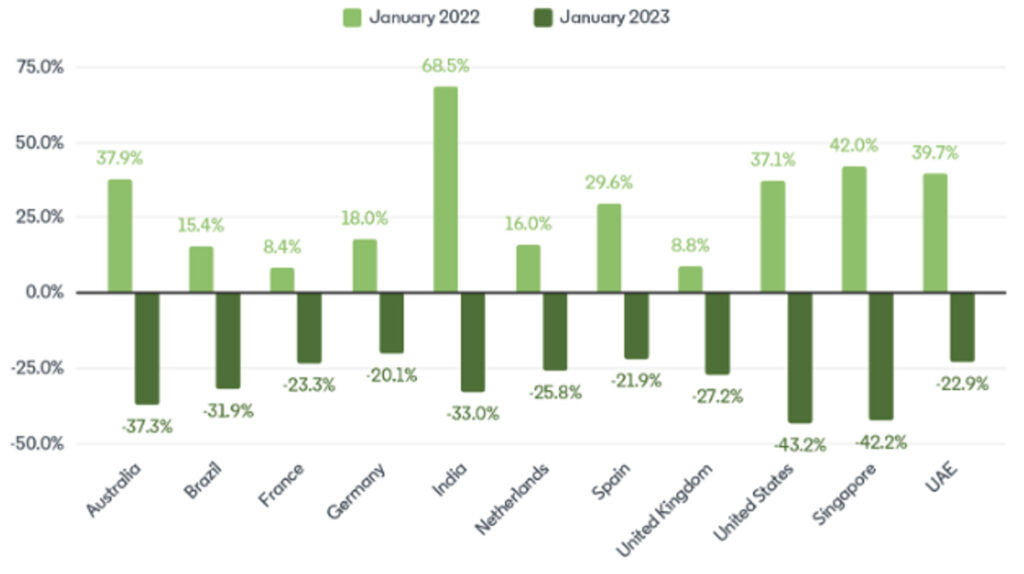The labor market right now is very unbalanced. And while there were 100,000 layoffs in January 2023, employers posted 517,000 job openings that same month – three times what labor analysts had predicted. In December 2022, there were two job openings for every applicant. In other words, while some employers are laying off people, others in some industries can’t find the right people (or enough of them) to fill their job openings.
Another anomaly right now is recalibration of sorts in certain industries. Industries that did well during the pandemic are starting to pullback in 2023. Across the globe, technology, information, and media industries are in a downturn as a whole.
For example in January 2022 in the U.S., hiring in these three industries overall was up 37.1%. But in January 2023, that trend had turned, and it was down – 43.2% – this drastic change in just 12 months. And as the chart below also shows, hiring in these industries was down across the board globally with some countries affected more than others.
Hiring in Technology, Information, and Media (Y/Y%)

Source: LinkedIn Economic Graph
Cybersecurity Is a Great Field to Get Into
But the downturn was not necessarily even across the board in these industries; some specialty areas within an industry are actually booming. Because cyber threats are on the increase – up 37% during the third quarter December 2022 compared to the previous quarter – jobs in cybersecurity, including cybersecurity specialists, engineers, managers and analysts are among the fastest growing jobs in the tech field in at least 17 countries. For example, the demand in this digital security field is so strong in Singapore, Brazil and Chile that right now it accounts for 20% of their 10 fastest growing careers.
The BLS shows for example the Information Security Analyst field is projected to grow by 35% over the next ten years. The median pay in this field in 2021 was $102,600/yr and usually a bachelor’s degree is required or less than five years of experience in a related field. Experience in a technology field that is trending down might qualify towards the experience requirement in a field that is trending up such as this one.
Climate Sustainability is Fast Growing
As environmental issues continue to grow due to climate change, so does the number of jobs that work to halt and reserves its effects. Climate sustainability jobs are also among the fastest growing jobs across the globe. Seven of nine European counties list it as part of the fastest-growing careers. In Saudi Arabia, environmental manager was their number one fastest growing career; in Canada sustainability manager was ranked number five.
Alternative Energy Is Hot
Another area within climate sustainability that is exploding right now is alternative energy. The Bureau of Labor Statistics (BLS) predicts this field will grow 44% in the next 10 years. That equates to 4,900 jobs. In most cases only post-secondary training taught at many community and vocational-type schools is all that is needed to gain entry to this field. Median pay in 2021 was $56,260/year.
Another alternative energy field that is growing is solar photovoltaic installer. While not quite as hot as the wind energy field, the BLS is still predicting a 27% growth or about 4,600 jobs during the next decade. These jobs usually require training at a community college or vocational-type school too. Median pay in 2021 for this job was $47,670/year.
If you are a veteran that is unemployed or in a field that is in decline right now, it could be time to use your GI Bill benefits and go back to school to get trained in any of these up-and-coming fields. For many of these, the training requirement is two years or less.




